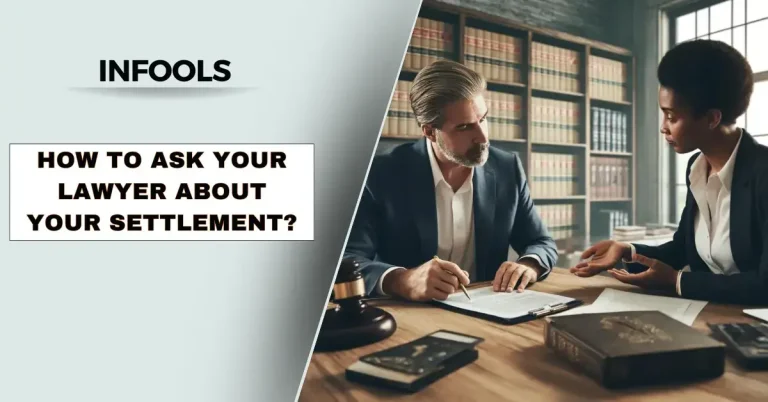If you want to know ‘how to ask your lawyer about your settlement’ in a personal injury case, clear communication with your lawyer is vital. First and foremost keep in mind, that a well-informed client contributes significantly to the success of their case.
You start by scheduling a meeting to discuss your case comprehensively. Then prepare a list of questions you want to address, focusing on the value of your claim, the legal process, expected timelines, and the potential outcomes.
Ask your lawyer about the strategy for your case. By understanding these key points and more, you can better navigate your case and actively participate in achieving a favorable settlement.
KEY POINTS
- On How to Ask Your Lawyer About Your Settlement? Begin by scheduling a comprehensive discussion with your lawyer to understand the value of your claim and the legal processes involved.
- Prepare and present detailed documentation such as medical reports and bills to substantiate your settlement request.
- Recognize the differences between settlements, jury awards, and arbitration to better navigate your case options.
- Consider all financial aspects including attorney fees, medical liens, and other expenses that affect the net settlement amount.
- Ensure you are informed about your rights and that your lawyer fulfills their responsibilities throughout the settlement process.
Table of Contents
Understanding the Basics: How To Ask Your Lawyer About Your Settlement
What is a Settlement?
A settlement is a legal agreement reached between two parties to resolve a dispute without going to trial.
So, in personal injury cases, this often involves the plaintiff agreeing to receive compensation in exchange for discontinuing any further legal claims against the defendant.
The primary aim is to compensate the injured party for damages like medical expenses, lost income, and pain suffered due to the accident.
Settlement vs. Jury Awards vs. Arbitration
Then understanding the differences between settlement types is crucial. Settlements are negotiated agreements that avoid the unpredictability of a jury verdict.
Unlike jury awards, which are determined after a trial, settlements are private agreements negotiated by the parties involved.
Then comes Arbitration, another form of resolving disputes, which involves a neutral third party making a binding decision, often faster and with less formal procedures than a courtroom trial.
Each method has its benefits and limitations at the same time, depending on the specifics of your personal injury case.
Choosing the Right Lawyer for Your Settlement – How to Ask Your Lawyer About Your Settlement?
Criteria for Selecting an Attorney
Before you know ‘how to ask your lawyer about your settlement’ Choosing the right personal injury attorney is the comes first in getting that settlement.
For starters, your attorney should have a strong track record in handling similar cases and securing substantial settlements or jury awards.
Look for a lawyer with expertise in personal injury law, particularly someone familiar with the laws and courts in your area, such as Colorado Springs or Pueblo if you are located in these regions.
Experience, client testimonials, and a clear understanding of injury law are key indicators of a capable attorney.
Importance of a Lawyer’s Track Record
A lawyer’s past success in settlements offers insight into their capability and experience in navigating complex negotiation landscapes.
It’s essential to review past client testimonials and case outcomes to gauge how effectively a lawyer can manage your personal injury settlement.
An experienced personal injury lawyer will not only understand the intricacies of the law but also know the strategies that work best in securing favorable settlement agreements.
How Long Does It Take to Negotiate a Settlement?
Phases of Negotiation
The negotiation process in a personal injury case typically unfolds in several stages:
- Demand Letter: Your attorney initiates by sending a demand letter to the opposing party, detailing your injuries and the compensation sought.
- Negotiation Rounds: Both parties engage in multiple rounds of discussions to reach an agreement on the settlement amount.
- Client Involvement: Throughout these stages, your lawyer should keep you informed and involved in the decision-making process.
Factors Influencing the Duration
Several factors can affect the length of the negotiation process:
- Insurer Willingness: The readiness of insurers to settle can speed up or slow down negotiations.
- Case Complexity: Legal complexities and the amount of money at stake can extend the negotiation period.
- Severity of Claims: Cases with substantial claims for severe injuries or wrongful death require more time due to the need for detailed evidence review and expert consultations.
Financial Aspects of Your Settlement – How to Ask Your Lawyer About Your Settlement?
Breakdown of Costs and Fees
Understanding the financial aspects of your settlement includes:
- Attorney Fees is typically calculated on a contingency basis, where the lawyer’s payment is a percentage of the settlement amount.
- Other than that discuss potential deductions from your settlement, such as liens and medical bills, which can impact the net amount you receive.

Distribution and Management of Settlement Funds
Once a settlement is agreed upon, The next step is to figure out the distribution of funds. It must be handled correctly to ensure all financial obligations are met before you receive your portion.
This involves paying any liens placed by medical providers or insurers, and ensuring all legal fees are accounted for.
Your lawyer should provide a clear list of how funds are allocated and the final amount you will receive, helping you understand the complete financial landscape of your settlement.
How do I write a settlement request?
Crafting Your Settlement Request – How to Ask Your Lawyer About Your Settlement?
When preparing a settlement request, clarity and detail are crucial. Start by clearly stating your injuries, the circumstances around the accident, and how these have impacted your life.
Make sure you include detailed documentation such as medical reports, bills, and proof of lost wages to substantiate your claim.
Your attorney can help alter this request to highlight the key elements that support the need for a substantial settlement.
This document is your opportunity to present a compelling case to the insurance company or opposing counsel, showing why a particular settlement amount is justified.
Maximizing Your Settlement Potential
To maximize your settlement, ensure that the request is not only comprehensive but persuasive. Use precise language to describe the extent of your injuries and the associated pain and suffering.
Don’t hesitate to include testimonials or expert opinions that support your claims. Your lawyer should advise on the legal strategies that can strengthen your case, such as citing relevant case law or statutes that apply to your situation.
The goal is to create a strong narrative that leaves little room for the opposing side to argue against the proposed compensation.
Read More: MWPFSettlement.com: All You Need To Know About Midwestern Pet Foods Class Action Settlements
Navigating Through Medical Liens and Expenses
Managing Medical Liens
As mentioned earlier, Medical liens are a common issue in personal injury settlements. These liens are claims made by healthcare providers or insurers to recover costs they advanced for your medical treatment.
It’s important to address these liens early in the settlement process. Your lawyer should negotiate these liens to ensure that they are fair and that you are not overburdened by medical costs after the settlement.
This is all because proper management of these liens can significantly affect the net amount you receive from your settlement.

Handling Other Expenses
Apart from medical liens, other out-of-pocket expenses related to the injury should also be accounted for in the settlement.
This includes costs for;
- ongoing medication,
- physical therapy, and
- any necessary adaptations to your living arrangements due to your injury.
You better discuss with your attorney how to document and claim these expenses effectively, ensuring they are covered in the final settlement.
A detailed listing of all related expenses helps present a comprehensive demand to the opposing party, increasing the likelihood of a satisfactory settlement.
Your Rights and the Attorney’s Responsibilities
Understanding Client Rights
As a client, you have certain rights throughout the settlement process. You’re not only supposed to do all the paperwork you also have certain rights associated.
These include the right to be informed about all aspects of your case, the right to make decisions regarding the settlement offer, and the right to transparent accounting from your attorney.
Som How to Ask Your Lawyer About Your Settlement is an important question but things to know about Ensure that your lawyer respects these rights and keeps you informed at every step.
Attorney’s Duties
Your attorney’s responsibilities include;
- providing competent representation,
- advocating on your behalf,
- maintaining confidentiality
- They must also manage the settlement funds responsibly and ensure that all disbursements are correctly accounted for.
They must communicate regularly and clearly about the progress of your case and any developments that might affect your settlement.
FAQs – How To Ask Your Lawyer About Your Settlement
How Do I Write a Settlement Request?
Writing a settlement request involves summarizing the facts of your case and explicitly stating the compensation you seek. Start by describing the accident and its impact on your life.
Detail your injuries, the medical treatment you received, and any ongoing health issues. List all expenses related to the injury, including lost wages.
Conclude with the total amount you are requesting for compensation. Ensure your language is clear and your claims are supported with documentation.
What Is the Hardest Question to Ask a Lawyer?
One of the hardest questions ‘How to Ask Your Lawyer About Your Settlement?’ and how much your case is actually worth.
This question is difficult because valuing a personal injury case involves many variables, including the severity of the injury, the clarity of liability, the defendant’s assets, and insurance coverage limits.
It requires your lawyer to make an informed but often uncertain estimation based on their experience and the specifics of your case.
How Much Should I Ask for in a Settlement?
The amount to ask for in a settlement should cover all your expenses and losses related to the injury, plus an additional amount for pain and suffering.
Calculate all medical bills, projected future medical costs, lost wages, and any other expenses caused by the injury. Consult with your lawyer to determine a fair amount for pain and suffering based on similar cases and their outcomes.
How Long Does It Take to Negotiate a Settlement?
The duration of settlement negotiations can vary widely. Some settlements are reached quickly, within a few months, while others can take years.
The timeline depends on the complexity of the case, the amount of money at stake, the willingness of the parties to compromise, and the caseload of the courts if a personal injury lawsuit is filed. Your lawyer can provide a more specific timeline based on the details of your case.
Conclusion – How to Ask Your Lawyer About Your Settlement?
So now you can understand ‘how to ask your lawyer about your settlement’ to cut it short, it is effective communication with your lawyer is crucial to navigating the complexities of a personal injury settlement.
Understanding the process, asking the right questions, and having clear expectations about the outcomes are essential.
Remember to keep all your documents organized, be proactive in understanding the legal terms and processes, and stay engaged with your lawyer throughout your case.
With the right approach, you can ensure a fair and satisfactory resolution to your personal injury claim.

Morgan Lee is a legal expert specializing in civil rights and corporate law. A graduate from a prestigious law school, Morgan is known for their clear and engaging analysis of complex legal issues, helping readers understand and appreciate the intricacies of law.

